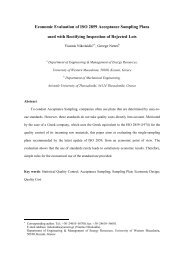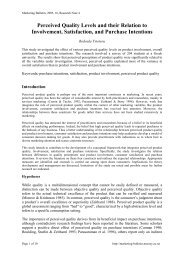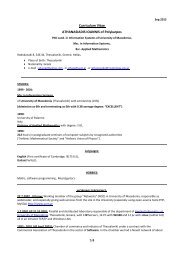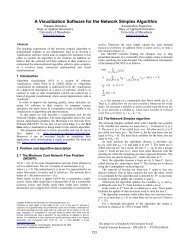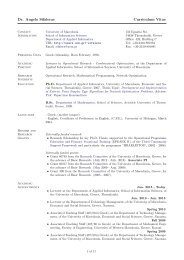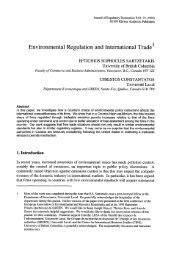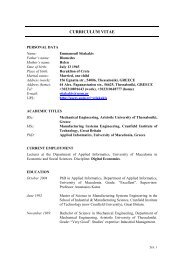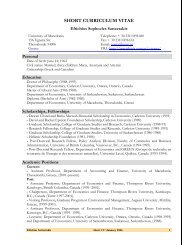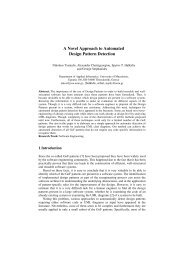- Page 1 and 2: HISTORICAL DICTIONARIES OF EUROPE J
- Page 3 and 4: 56. Slovenia, 2nd edition, by Leopo
- Page 5 and 6: Historical Dictionary of Modern Gre
- Page 7 and 8: To Roula and all my teachers 09_152
- Page 9 and 10: Contents Editor’s Foreword Jon Wo
- Page 11 and 12: Editor’s Foreword Few countries h
- Page 13 and 14: Preface Writing a historical dictio
- Page 15 and 16: PREFACE • xv much for the achieve
- Page 17 and 18: Acronyms and Abbreviations AKEL CAP
- Page 19 and 20: Map 1. Map of Ancient Greece 09_152
- Page 21 and 22: Map 3. Road Map of Greece 09_152_01
- Page 23 and 24: Chronology 3000-2000 BC An early Br
- Page 25 and 26: CHRONOLOGY • xxv 1829 At the conc
- Page 27 and 28: 1920 10 August: The Treaty of Sèvr
- Page 29 and 30: CHRONOLOGY • xxix Kentrou), dismi
- Page 31 and 32: CHRONOLOGY • xxxi territorial cla
- Page 33 and 34: Introduction Located in the souther
- Page 35 and 36: INTRODUCTION • xxxv in Greece; th
- Page 37 and 38: INTRODUCTION • xxxvii Castoriades
- Page 39 and 40: INTRODUCTION • xxxix ism to the G
- Page 41 and 42: INTRODUCTION • xli The conflict b
- Page 43 and 44: INTRODUCTION • xliii NEW CHALLENG
- Page 45: INTRODUCTION • xlv of the develop
- Page 49 and 50: The Dictionary - A - ADMINISTRATION
- Page 51 and 52: AGRICULTURE • 3 rades, and after
- Page 53 and 54: ALBANIA • 5 Change came abruptly
- Page 55 and 56: ALEXANDER THE GREAT • 7 the popul
- Page 57 and 58: ANENDOTOS • 9 defeat of the invad
- Page 59 and 60: ANGELOPOULOS, THEODOROS • 11 side
- Page 61 and 62: ARAB WORLD • 13 Apostasia was the
- Page 63 and 64: ASIA MINOR CATASTROPHE • 15 of Ni
- Page 65 and 66: ASIA MINOR CATASTROPHE • 17 Veniz
- Page 67 and 68: ATHENS • 19 More recently, there
- Page 69 and 70: BALKANS • 21 give up much of Mace
- Page 71 and 72: BARTHOLOMEW I • 23 Today, there a
- Page 73 and 74: BYZANTINE EMPIRE • 25 century, wa
- Page 75 and 76: CAPODISTRIAS, IOANNIS • 27 Greece
- Page 77 and 78: CENTER UNION • 29 CAVAFY, CONSTAN
- Page 79 and 80: CINEMA • 31 the identity cards is
- Page 81 and 82: CIVIL WAR • 33 local socioeconomi
- Page 83 and 84: COALITION OF THE RADICAL LEFT • 3
- Page 85 and 86: COMMUNIST PARTY OF GREECE • 37 cu
- Page 87 and 88: CONSTANTINE I GLÜCKSBURG • 39 ab
- Page 89 and 90: CONSTANTINOPLE • 41 took power in
- Page 91 and 92: CONSTRUCTION • 43 Since then, Gre
- Page 93 and 94: The question of how to delineate th
- Page 95 and 96: CYCLADES • 47 dependence on Great
- Page 97 and 98:
CYPRUS QUESTION • 49 and the incr
- Page 99 and 100:
DECEMBER AFFAIR • 51 the National
- Page 101 and 102:
DEMOCRACY • 53 DELIGIORGIS, EPAMI
- Page 103 and 104:
DIMAS, PYRROS • 55 Today’s Gree
- Page 105 and 106:
ECONOMY • 57 and dependent on rev
- Page 107 and 108:
EDUCATION • 59 he continues to le
- Page 109 and 110:
ENERGY • 61 so-called generation
- Page 111 and 112:
ENVIRONMENT • 63 the Cypriot gove
- Page 113 and 114:
EURO • 65 leadership of an ambiti
- Page 115 and 116:
FERAIOS, RIGAS • 67 of the econom
- Page 117 and 118:
FINOS FILMS • 69 FINANCES. The Gr
- Page 119 and 120:
FOREIGN POLICY • 71 tions, Florak
- Page 121 and 122:
FRANCE • 73 leader. As the riches
- Page 123 and 124:
GEOGRAPHY • 75 Frederika played a
- Page 125 and 126:
GEORGE II • 77 George was the sec
- Page 127 and 128:
GOUNARIS, DIMITRIOS • 79 Gonatas
- Page 129 and 130:
GREAT BRITAIN • 81 or, better, pa
- Page 131 and 132:
GREEK-OTTOMAN WAR • 83 long-term
- Page 133 and 134:
choreographer Rallou Manou, and man
- Page 135 and 136:
IRREDENTISM • 87 British protecti
- Page 137 and 138:
JUNTA • 89 nio in downtown Athens
- Page 139 and 140:
KARAMANLIS, KONSTANTINOS • 91 194
- Page 141 and 142:
KAZANTZAKIS, NIKOS • 93 the first
- Page 143 and 144:
KOUN, KAROLOS • 95 Capodistrias,
- Page 145 and 146:
LEGAL SYSTEM • 97 east. Koine was
- Page 147 and 148:
MACEDONIA • 99 in which some of t
- Page 149 and 150:
MACEDONIA, FORMER YUGOSLAV REPUBLIC
- Page 151 and 152:
MAKARIOS III • 103 independent re
- Page 153 and 154:
MAKARIOS III • 105 proposed chang
- Page 155 and 156:
people, and their character. It has
- Page 157 and 158:
MINORITIES • 109 Metaxas’ rule
- Page 159 and 160:
MONARCHY • 111 while trying to br
- Page 161 and 162:
MUSIC • 113 In Athos, fortresslik
- Page 163 and 164:
NATIONAL LIBERATION FRONT • 115 N
- Page 165 and 166:
NATIONAL ORGANIZATION OF CYPRIOT FI
- Page 167 and 168:
NORTH ATLANTIC TREATY ORGANIZATION
- Page 169 and 170:
ORTHODOX CHURH OF GREECE • 121 ca
- Page 171 and 172:
OTTO WITTELSBACH • 123 Orthodoxy
- Page 173 and 174:
PANHELLENIC SOCIALIST MOVEMENT •
- Page 175 and 176:
PAPAGOS, ALEXANDROS • 127 his sea
- Page 177 and 178:
PAPANDREOU, ANDREAS • 129 At his
- Page 179 and 180:
PAPANDREOU, GEORGIOS • 131 in Ath
- Page 181 and 182:
PAUL, KING OF GREECE • 133 tive n
- Page 183 and 184:
POLITICAL PARTIES • 135 hold over
- Page 185 and 186:
PUBLIC POWER COMPANY • 137 the un
- Page 187 and 188:
confined to house arrest. In 1974,
- Page 189 and 190:
REVOLUTION • 141 REVOLUTION. Ther
- Page 191 and 192:
SEFERIS, GEORGIOS • 143 military
- Page 193 and 194:
SHIPPING • 145 appeared as a Gree
- Page 195 and 196:
SOFOULIS, THEMISTOKLIS • 147 agre
- Page 197 and 198:
TERRORISM • 149 style; since the
- Page 199 and 200:
THESSALONIKI • 151 of the new fre
- Page 201 and 202:
THRACE • 153 ficient in cereals a
- Page 203 and 204:
TREATY OF LAUSANNE • 155 ecotouri
- Page 205 and 206:
TRIKOUPIS, HARILAOS • 157 Empire
- Page 207 and 208:
TURKEY • 159 Moralis, established
- Page 209 and 210:
UNITED STATES • 161 its tradition
- Page 211 and 212:
VENIZELOS, ELEFTHERIOS • 163 The
- Page 213 and 214:
VENIZELOS, ELEFTHERIOS • 165 Schi
- Page 215 and 216:
WAR OF INDEPENDENCE • 167 second
- Page 217 and 218:
WOMEN • 169 against civilians att
- Page 219 and 220:
WORLD WAR II • 171 tility between
- Page 221 and 222:
ZORBAS, ALEXIS • 173 is further c
- Page 223 and 224:
Appendix A: Kings of Greece 1833-19
- Page 225 and 226:
Appendix B: Presidents of Greece 18
- Page 227 and 228:
Appendix C: Prime Ministers of Mode
- Page 229 and 230:
PRIME MINISTERS OF MODERN GREECE
- Page 231 and 232:
PRIME MINISTERS OF MODERN GREECE
- Page 233 and 234:
Appendix D: National Election Resul
- Page 235 and 236:
NATIONAL ELECTION RESULTS IN GREECE
- Page 237 and 238:
NATIONAL ELECTION RESULTS IN GREECE
- Page 239 and 240:
NATIONAL ELECTION RESULTS IN GREECE
- Page 241 and 242:
Appendix E: Basic Data on Greece GE
- Page 243 and 244:
BASIC DATA ON GREECE • 195 PEOPLE
- Page 245 and 246:
BASIC DATA ON GREECE • 197 time d
- Page 247 and 248:
BASIC DATA ON GREECE • 199 Distri
- Page 249 and 250:
BASIC DATA ON GREECE • 201 thus i
- Page 251 and 252:
Appendix F: Economic Statistical Ch
- Page 253 and 254:
Graph 4. Greece: Public Deficit Gra
- Page 255 and 256:
Bibliography I. General A. General
- Page 257 and 258:
BIBLIOGRAPHY • 209 of the Balkans
- Page 259 and 260:
BIBLIOGRAPHY • 211 century Greece
- Page 261 and 262:
BIBLIOGRAPHY • 213 New Geopolitic
- Page 263 and 264:
BIBLIOGRAPHY • 215 Hellander, Pau
- Page 265 and 266:
BIBLIOGRAPHY • 217 Driault, Edoua
- Page 267 and 268:
BIBLIOGRAPHY • 219 Hussey, Joan M
- Page 269 and 270:
BIBLIOGRAPHY • 221 Clogg, Richard
- Page 271 and 272:
BIBLIOGRAPHY • 223 Mackenzie, Com
- Page 273 and 274:
BIBLIOGRAPHY • 225 Theodorakis, M
- Page 275 and 276:
BIBLIOGRAPHY • 227 Papacosma, Vic
- Page 277 and 278:
BIBLIOGRAPHY • 229 Eddy, Charles.
- Page 279 and 280:
BIBLIOGRAPHY • 231 Tsoukalis, Lou
- Page 281 and 282:
BIBLIOGRAPHY • 233 Orfanos, Spyro
- Page 283 and 284:
BIBLIOGRAPHY • 235 Ethier, Diane.
- Page 285 and 286:
BIBLIOGRAPHY • 237 Askouni, N.
- Page 287 and 288:
BIBLIOGRAPHY • 239 Kakridis, Ioan
- Page 289 and 290:
BIBLIOGRAPHY • 241 Walcot, Peter.
- Page 291 and 292:
BIBLIOGRAPHY • 243 Tsaktsiras Lam
- Page 293 and 294:
BIBLIOGRAPHY • 245 ———. The
- Page 295 and 296:
BIBLIOGRAPHY • 247 Papadiamantis,
- Page 297 and 298:
BIBLIOGRAPHY • 249 Alexiou, Marga
- Page 299 and 300:
C. History www.agp.gr The Andreas G
- Page 301 and 302:
About the Author Dimitris Keridis i




